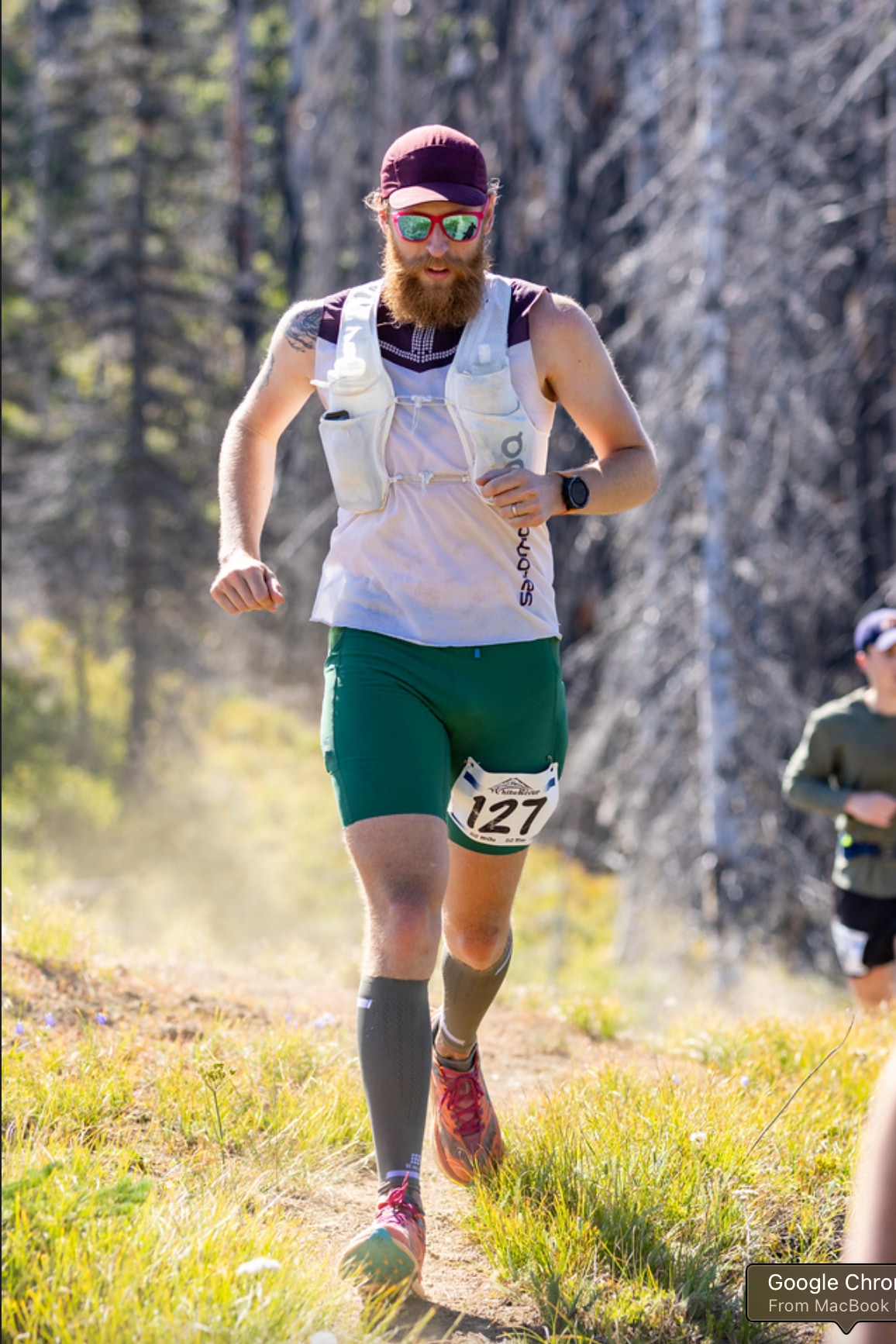Some people run marathons for the challenge, some people see running as a tool for fitness. Then, there are those of us who simply can’t imagine an alternative to the running life. Whatever your reason for committing to a marathon, we applaud you! As you start your journey, you’ll likely find that as with selecting your race and building your training plan, fine-tuning your gear is an integral part of the process.
Our checklist contains the most helpful marathon training and racing gear, from race-day-specific items to stuff you’ll end up using all the time. Some of your current go-tos may be on this list, but it’s still worthwhile to peruse this list to make sure you’ve got all your bases covered on your way to completing those 26.2 miles.
Getting ahead of yourself? If your running gear needs a refresh, check out our Essential Running Gear Checklist to fill out the basics.
Marathon Essentials
For quick recommendations, click below, or keep scrolling for more information.
- Race-day shoes
- Racing tops (and sports bras)
- Racing bottoms
- Running fuel
- Hydration belt, hydration vest or handheld water bottle
- Lubrication
- GPS watch
- Headphones
- Massage tools
- Recovery footwear
Footwear
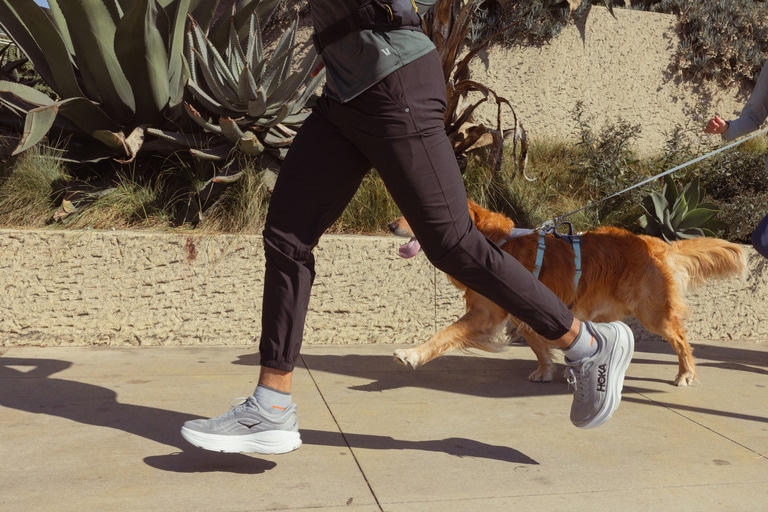
1. Race-day shoes
There is no one perfect marathon shoe. The type of shoes you choose will depend on your goals. If you’re looking to set a new PR, you’ll want to select a highly responsive, speed-oriented shoe. If, on the other hand, you prefer to ramp up comfort over 26.2 hard miles, a max cushion shoe is probably a better choice. Whatever your goals, selecting the perfect shoes for race day is just like picking out any other pair of running shoes: The most important thing is that they feel good for your feet.
Marathon Speed Shoes
Brooks Hyperion Max 2 Road-Running Shoes
Cushioning Maximum
Heel-to-toe drop (mm) 6
Weight (pair) 1 lb. 0.6 oz. (women's); 1 lb. 2.2 oz. (men's)
When it comes to combining speed and comfort, the Hyperion Max 2 from Brooks leads the pack. Stuffed with highly responsive, nitrogen-infused DNA Flash v2 foam and featuring a SpeedVault plate within the rockered midsole, this shoe actively propels you forward, helping you push your pace over the long run. Buy men's and women's.
Marathon Max-Cushion Shoes
HOKA Bondi 9 Road-Running Shoes
Cushioning Maximum
Heel-to-toe drop (mm) 5
Weight (pair) 1 lb. 2 oz. (women's); 1 lb. 5 oz. (men's)
It's no wonder they're so popular—HOKA has become synonymous with cushion, and the Bondi is the brand's classic max-cushion shoe. This latest version features more than 40 mm of stack height in the heel for super-soft landings. And it’s not just the midsole that’s designed for comfort; the engineered mesh uppers and soft heel collars make for one heck of a comfortable running experience. Buy men's and women's.
Marathon Trail-Running Shoes


norda 001 Trail-Running Shoes
Cushioning Maximum
Heel-to-toe drop (mm) 5
Weight (pair) 1 lb. 0.3 oz. (women's); 1 lb. 3 oz. (men's)
If you’re opting for a marathon that shuns paved paths, a pair of trail-running shoes is the way to go. The 001 from norda is designed to last, using highly durable materials from the outsole all the way to the laces. With plenty of lightweight cushioning to keep you protected from the trail, aggressive lugs for traction on any surface and an innovative upper design that provides a secure fit, the 001s should be able to handle whatever terrain you throw at them. Buy men's and women's.
Shop expert-recommended running shoes: Best Running Shoes for Racing: Staff Picks | Best Road-Running Shoes: Tested | Best Trail-Running Shoes: Tested.
Clothes
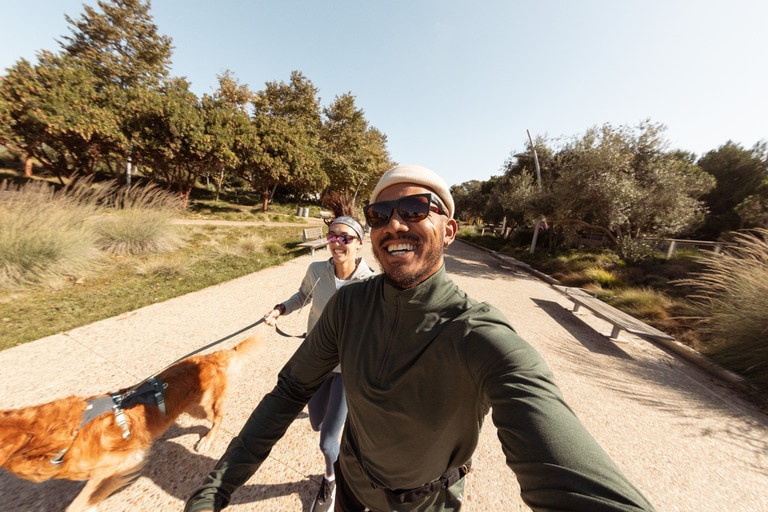
2. Racing tops
Just like your daily running shirts, a race-specific shirt should be made of wicking, quick-drying fabric—and never cotton. And the marathon is long and unpredictable, so you’ll also want to look for features like flat seams and underarm gussets that are designed to reduce chaffing and provide additional range of motion. Race shirts will also usually feature a slim fit to reduce the drag (the resistance that can make running feel harder and slow you down) from fabric flapping in the wind.
Need a sports bra? Check out our staff-picks guide Best Running Sports Bras.
Marathon Singlet
Brooks Distance Tank Top 3.0
Fabric 88% recycled polyester/12% lyocell
Sustainability Contains recycled materials
Staying cool and comfortable during your marathon is key, and the Distance Tank Top 3.0 from Brooks can help you do just that. Designed with ultrasoft, moisture-wicking and quick-drying fabric, this tank is great for everything from racing to gym sessions to days on the trail. The top’s loose, lightweight fit means you’ll barely notice it after many miles plugging away at your marathon. All the color options are a fun bonus too. Buy men's and women's.
Racing in cool weather or need an extra layer for the trails? The Core Long-T Shirt from On will do the trick. Buy women's and men's.
Teeth-chattering cold? The women's Rho Crew Neck Long-Sleeve Base Layer Top or the men's Rho LT Crew Neck Base Layer Top from Arc'Teryx will keep you toasty.
3. Racing bottoms
Much as with racing tops, racing bottoms should check all the same boxes that your daily shorts do; wicking, quick-drying, soft fabrics are a must. You can certainly wear your standard running bottoms on race day, but many people choose a pair of half tights to minimize weight, decrease the friction that leads to chafing and reduce drag. If you haven’t yet discovered the wonder of half tights, prepare to be amazed.
Marathon Bottoms
REI Co-op Swiftland 6" Running Short Tights
Fabric 71% nylon/29% spandex (bluesign approved)
Inseam 6 inches (women's); 9 inches (men's)
Number of pockets 5 (women's); 3 (men's)
Made with stretchy, wicking fabric, and featuring a stay-put waistband, chafe-free seams, and an inseam gusset, the REI Co-op Swiftland Running Short Tights are so comfortable that you might forget you’re wearing them. Add in phone-sized, bounce-free side compression pockets—perfect for carrying all the fuel you’ll need for your race—and you’ve got the ideal marathon racing bottoms. Buy women's and men's.
Looking for winter-friendly options for running pants or tights? Check out our Cold-Weather Running Gear guide. Or for a staff pick, Expert Advice Run editor Cassie da Costa loves the Core Pants from On, calling them "comfortable, unrestrictive and even a little stylish." Buy women's and men's.
Nutrition
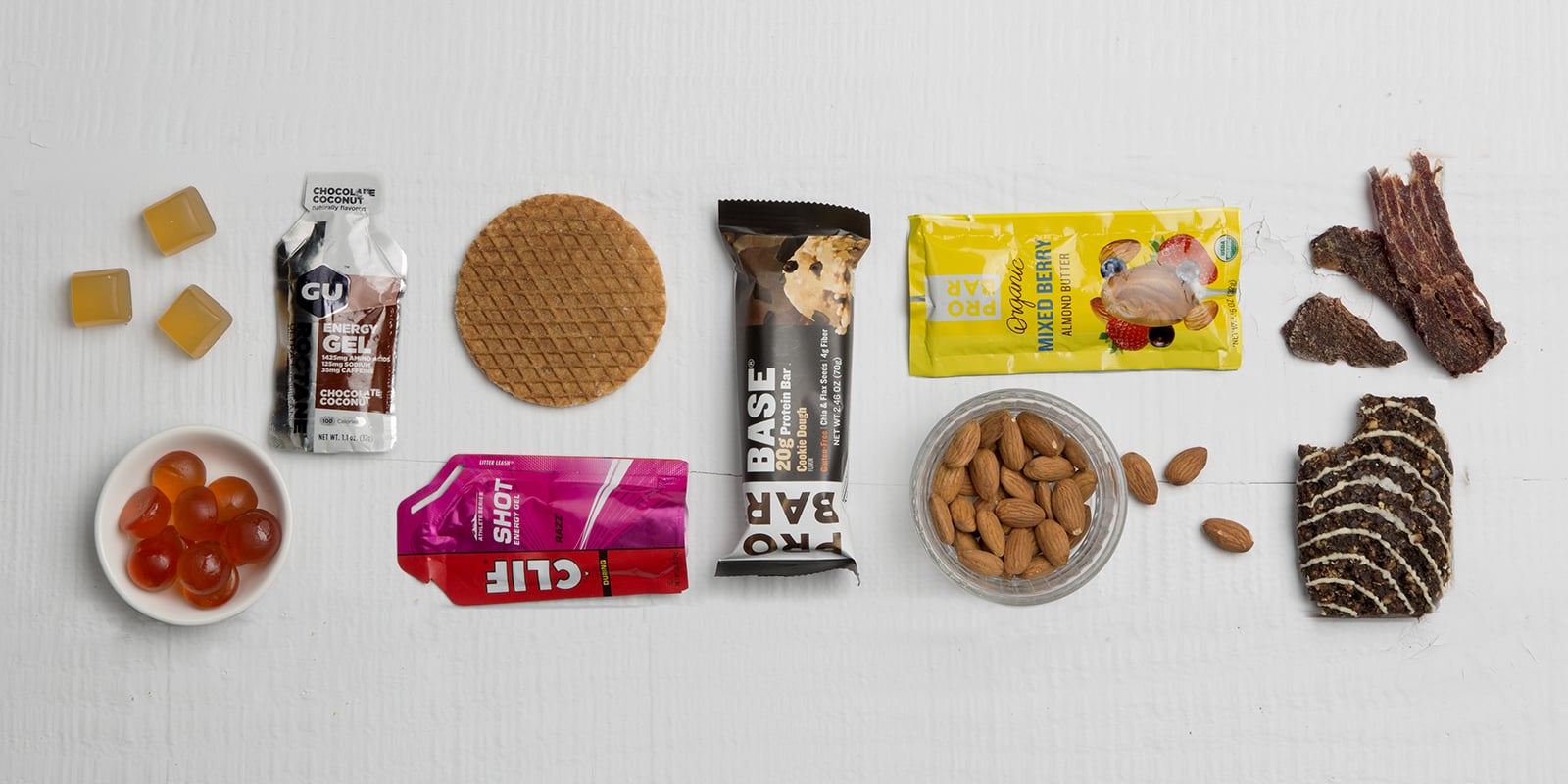
4. Running Fuel
From gels to gummies to granola bars, there are plenty of options for keeping yourself fueled during your race. Everyone's nutritional needs are different, so consider what tastes best to you and doesn’t bother your stomach. Many people use energy gels since they slide easily into a pocket, are packed with quick-burning carbs and are quick to consume. However, some people find gel's consistency difficult to stomach and opt instead for chewable gummies, which pack the same amount of fuel per serving but can be gentler on the gut. The old advice, “nothing new on race day,” is especially applicable to your running fuel, so make sure to try a variety of options and train with the same food you plan to eat during your race. Learn more by reading Nutrition for Runners.

GU Energy Gel
Calories per serving 100
Carbohydrates 20–25 grams
Sodium 40–55 milligrams
Gluten-free Yes
Vegan Yes
A mainstay of marathon hydration and nutrition tables, GU has been in the performance food business for almost as long as performance food has been a thing. Their Energy Gel has become the go-to for many runners looking to fuel runs with minimal impact on their GI system. Each 1.1-ounce gel contains 100 calories, about a quarter of which come in the form of quick-burning carbohydrates. In addition to treating your taste buds—there are over a dozen options from birthday cake to salted watermelon—several flavors contain caffeine for an extra boost when your tank is running low. Buy here.
Accessories and Recovery
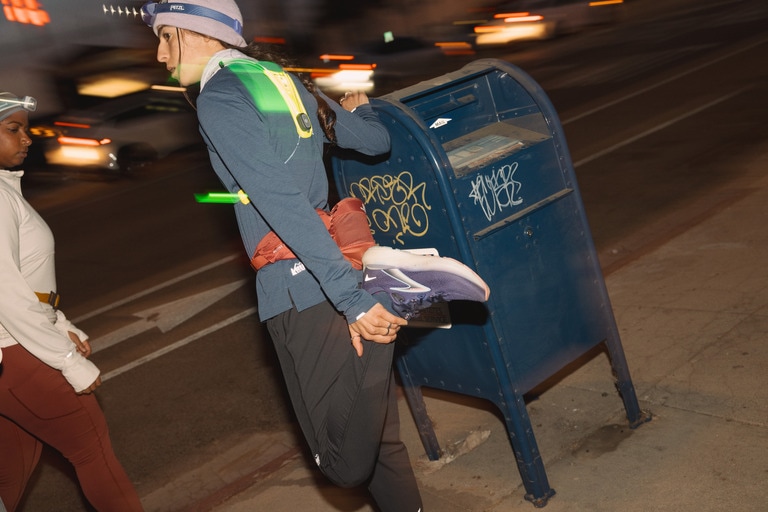
5. Hydration belt, hydration vest or handheld water bottle
While many races have hydration stations set up along the course, they can be far enough apart that you may need to bring your own water. It’s also easy to get caught up in the excitement and forget to hydrate as much as you should. Carrying a handheld bottle, or using a hydration belt or vest with bottles, will help keep you on track between water stations and make sure you’re covered should you forget to stop at one. Carrying your own fluids also allows you to use the same electrolyte mix you trained with. If you’re signed up for an official race, just make sure to check that they allow the kind of hydration pack you’re training with.
Marathon hydration belt
UltrAspire Speedgoat 3.0 Hydration Waist Pack
Gear capacity 1.75 liters
Liquid capacity 37.2 fluid ounces or 1.1 liters
Fits waist/hips 28–40 inches
For low-profile hydration that leaves your hands free for on-course high fives, the Speedgoat 3.0 Hydration Waist Pack from UltrAspire is a great choice. Optimized for long-distance trail running, but working just as well on road, this waist pack includes two easy-to-reach 550 ml bottles, a zippered pocket for your fuel and a stretch-mesh pocket for your phone. Most importantly, the fit is easy to adjust on the go, and the shape and weight distribution of the pack help minimize bounce so you can focus on your race. Buy here.
REI Co-op Swiftland Handheld Water Bottle - 14 fl. oz.
Liquid capacity (fl. oz.) 14 fluid ounces
BPA free Yes
Weight 3 ounces
The Swiftland Handheld Water Bottle from REI Co-op can carry up to 14 fluid ounces in a removable soft flask (just under half a liter) and includes a small pocket for your keys or a snack. The bottle is designed to be held in multiple ways—use one strap or two, and put your fingers behind the pocket or around it—so you can mix up your grip throughout your run. It also uses a simple pull-tab adjustment system to make it easy to tighten the strap as you drink. Buy here.
Shop our member-tested running hydration vest picks: The Best Running Hydration Vests: Tested
6. Lubrication
If you’ve been training for a marathon, chances are you’ve experienced chafing, blisters or both. To minimize the friction that causes these particularly unpleasant skin irritations, you can try different fabrics, test out new shoes or change up the fit of your clothes. Better still, you can lube yourself up. There are a few options to choose from, so look for one that’s easy to apply, lasts as long as you need it to and feels good on your skin. Learn more from our article Managing Chafing.
Marathon Anti-Chafing Balm

Bodyglide Anti-Chafe Formula Skin Protectant - 1.5 oz.
The Anti-Chafe Formula Skin Protectant from Bodyglide is the most popular anti-chafing balm out there. It’s easy to apply, gliding on just like a stick of deodorant, and the petroleum- and fragrance-free formula includes aloe vera and vitamin E to help moisturize your skin while reducing the friction that leads to chafing and blisters. It’s long-lasting and works on pretty much any part of your body that needs relief—many runners even slather it on their feet to prevent blisters on long runs. Buy here.
7. GPS watch
Whether you’re looking to get your first GPS watch or you’re ready to upgrade, there are several features to consider for what you'll use for a marathon. Beyond the basics of accurately tracking time and distance, time- or distance-based nutrition reminders, the ability to customize your activity screens, and onboard mapping can all help you nail your training. Some watches even include race-specific training features to help you meet your mileage and pacing goals leading up to the marathon. For an array of options selected by REI Co-op Members and staff, check out our gear guide for the Best Running GPS Watches.
Marathon Running GPS Watch
Garmin Forerunner 965
Best use Multisport
Display size 1.4 inches
Battery life Up to 23 days in smartwatch mode; up to 31 hours in GPS mode; up to 10.5 hours in GPS-only GNSS mode with music
The Garmin Forerunner 965 is designed not only to track your runs, but also to help you train for your race. In addition to featuring top-of-the line GPS accuracy, more than 30 hours of battery life in GPS mode, and the ability to download and play music, the 965’s built-in training features can suggest daily workouts based on the course you input while also adapting those workouts to your performance and recovery. It’s like having a running coach on your wrist. A bright touchscreen and built-in maps complete the package. Buy here.
8. Headphones
While some runners opt to go au naturel on race day, many racers appreciate having music to help them stay focused or to give them an energy boost when the wheels start to come off late in the race. Many racers will choose an open-ear style for race day so they can enjoy their music while keeping an ear out for race officials and staying aware of other runners on the course. (Some races may discourage or restrict headphone use, so make sure you check the rules ahead of time.)
Marathon Headphones
Shokz OpenSwim Pro Headphones
Headphone type Behind neck
Wireless Yes
Weight 1 ounce
MP3 storage 32GB (up to 8,000 songs)
The waterproof OpenSwim Pro Headphones from Shokz rest just in front of your ears and use bone-conduction technology rather than traditional speakers to leave you free to hear the shouted encouragement of spectators and directions from race officials or aid station volunteers. These are the swimmer-specific version of the OpenRun line of headphones, which means they can be submerged in water up to 2 meters for two hours (triathletes, rejoice). For those sticking to land pursuits, you can download songs directly onto the headphones so you can bring your music on the course while leaving your phone or concerns about on-course data connectivity issues behind. And they’re so lightweight that you may forget you’re wearing them. Buy here.
9. Massage tools
Congratulations, you’ve just finished your race, your body is flooded with endorphins and you’re on top of the world! Next come the aches and pains. The process of massaging out knots and tightness can help you increase your range of motion and decrease recovery time after a hard workout during training or the race itself. From simple massage balls to high-tech massage guns, there’s a wide range of tools to help aid your recovery. The tool that’s right for you will depend on your personal preference, and which areas need the most attention—for instance, a massage gun makes it easier to target tight quads, but a foam roller is a better option for your upper back, which you can’t quite access with massage gun without help.
To learn more, read our article How to Use a Foam Roller.

Trigger Point Performance GRID Foam Roller
Material(s) EVA foam
Dimensions 5.5 x 13 inches
Weight 1 lb. 8 oz.
The foam roller is one of the most common recovery tools, but talk to any regular user and they’ll tell you about the love/hate relationship they have with it—foam rolling can feel like a necessary evil for very sore muscles. One of the most popular and effective foam rollers is the GRID from Trigger Point Performance. By using your body weight, firm EVA foam and a patterned surface for a variety of massage experiences, the GRID helps release tightness. Its hollow core makes it more durable and packable (for a foam roller), making it easy to add to your post-race and training recovery kit. Buy here.
Hyperice Hypervolt Go 2 Massager
Material(s) PC ABS plastic/nylon plastic/aluminum/stainless steel/copper (wires)/lithium-ion batteries
Dimensions 7.3 x 6.7 x 2 inches
Weight 1 lb. 8 oz.
When you need to release stubborn knots, or target a hard-to-reach muscle, it’s hard to beat a massage gun. The Hypervolt Go 2 Massager from Hyperice is small but mighty with a powerful 40-watt motor, three speeds and three-hour battery life. It’s also extremely quiet and very packable, making it easy to prioritize recovery on the way to or from your marathon. Buy here.
10. Recovery footwear
The only thing that feels better than taking off your shoes at the end of grueling race is stepping into a pair of plush, supportive recovery sandals. Your feet will thank you.
Marathon Recovery Slides
OOFOS OOahh Slide Sandals
Midsole Propietary OOfoam
Gender Unisex
Active recovery is the name of the game with OOFOS. The proprietary foam in the brand's OOahh Slide Sandals absorbs over a third more impact than traditional EVA. Combined with a recovery-optimized geometry, the OOahhs are designed to help get your feet, legs and back feeling strong ASAP. They also have the added benefit of being machine washable and bacteria-resistant so you can bring them to your race or training session without worrying about stinking up the rest of your gear. Buy here.
Our Process
To compile this list of running essentials, the author interviewed runners, including REI Co-op Members, consulted REI Expert Advice articles and drew on his own experience as a dedicated road and trail runner. Product recommendations are based on reviews from REI customers and represent some of the latest and most popular running gear offered by REI Co-op.














































![Swiftland Handheld Water Bottle - 14 fl. oz. [Back view]](/media/17268d55-b1d4-4319-9933-3a38ffb5700b/?size=440)















![OOahh Slide Sandals [Left view]](/media/21a3987b-08bf-4c61-be63-6058a72ff877/?size=440)
![OOahh Slide Sandals [3/4 view]](/media/766e86ee-28a9-4cf6-bf5c-874dedfec7bc/?size=440)
